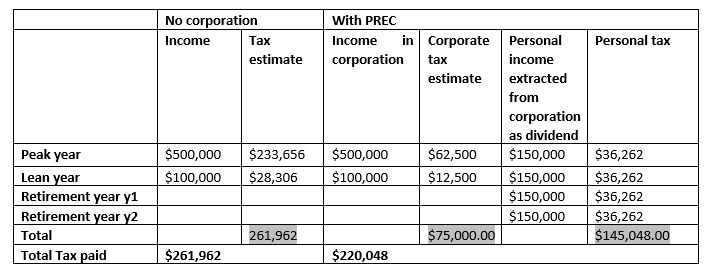Accountants, engineers, lawyers, doctors, dentists. Now
real estate professionals join the Ontario regulated professionals
who are able to personally incorporate their business.
Following several other provinces,1
on October 1 2020, the Ontario government passed O/Reg 536/20:
Personal Real Estate Corporations, under the Real Estate and
Business Brokers Act, 2002, which provides that real estate
salespeople and brokers may incorporate in Ontario. Incorporation
allows a real estate professional to have their self-employed
revenue paid directly into their personal real estate corporation
(“PREC“), offering some tax
advantages.
Tax Advantage
The key tax advantage of incorporation is that income earned in
a PREC is taxed at the corporate tax rate, which is substantially
lower than the personal tax rate.
In Ontario the combined federal and provincial corporate tax
rate is 12.5% on the first $500,000 of active business income (a
threshold amount that is shared among associated corporations), and
26.5% on income above that threshold. In contrast, the highest
personal tax rate is 53.52% on income over $220,000. As a result,
when income is retained in a PREC and taxed at the corporate rate,
a greater amount of money is available for investment.
For example, if a real estate professional earned $500,000 in a
year, without a corporation the professional would have
approximately $266,344 of after tax income that could be invested.
In contrast, making use of a PREC, the same income would result in
approximately $437,500 of funds available for investment within the
corporation.
This may increase the investment growth and allow an investment
portfolio or a retirement portfolio to grow more quickly, keeping
in mind that within the corporation the investment income itself
will likely be taxed a higher rate than the active business
income.
An additional tax advantage is that the real estate professional
can distribute their career earnings over their lifetime.
Rather than pay the highest personal tax rate in peak earning
years, the real estate professional can extract income from the
corporation in leaner years, or in retirement, at a lower marginal
tax rate. For example:

As the chart indicates, using a PREC allows a real estate
professional to distribute income earned over multiple years, in
turn allowing the professional to access lower marginal tax
rates. This can reduce the total amount of taxes paid over a
lifetime.
Life Insurance
A further benefit offered by a PREC is that life insurance for
the controlling shareholder can be held within the corporation,
reducing the amount of pre-tax earnings required to cover the
premiums. In addition, life insurance benefits, less the adjusted
cost base of the policy, are credited to a corporation’s
capital dividend account (“CDA“) and can
be extracted from a corporation free of tax. The reduction of the
credit to the CDA by the policy’s adjusted cost base is
intended to offset the advantage of paying insurance premiums with
corporate income, instead of personal income taxed a personal tax
rates. Real estate professionals considering having a PREC purchase
life insurance should also note that in most cases the PREC will
not be entitled to deduct the expense of the insurance
premiums.
Income Splitting
The 2017 amendments to the Income Tax Act introduced the tax on
split income rules, know as “TOSI”, which have
significantly curtailed the ability of professionals to use
professional corporations to split their income with low earning
family members. Previously, professionals could pay dividends from
their corporations to family members with low income, allowing the
family to benefit from the lower tax rate applicable to the
professional’s spouse or children. The TOSI rules now
require that in order for corporate dividends to be taxed in the
hands of a lower earning family member, that family member must be
actively engaged in the professional’s business, meaning, for
example, that the family member works in the business at least an
average of twenty hours per week.
Restrictions
A PREC can limit a controlling shareholder from standard
corporate financial liabilities. However, a PREC does not limit
professional liability, which is governed by the Real Estate
Council of Ontario pursuant to the Real Estate and Business
Brokers Act, 2002.
In addition, like other professional corporations, PRECs are
subject to restrictions. In particular, all of the equity
shares of a PREC must be held directly or indirectly by the
controlling shareholder, being an individual salesperson or broker
registered with the Real Estate Council of Ontario;2 the controlling shareholder must be
employed by a brokerage; the controlling shareholder, must be the
sole director and officer of the corporation;3 and family members of the registrant
can only hold non-voting and non-equity shares of the
corporation.
Conclusion
Given the current “heat” of the Toronto real estate
market, incorporation may be an attractive option for real estate
agents or brokers. However, unless a real estate professional
is earning substantially more than their everyday expenses,
incorporation may not be beneficial. Additionally, real
estate professionals should take the TOSI rules into account when
deciding whether or not to incorporate. Anyone considering
establishing a PREC should consult with their tax professionals for
specific advice.
The content of this article is intended to provide a general
guide to the subject matter. Specialist advice should be sought
about your specific circumstances.

























